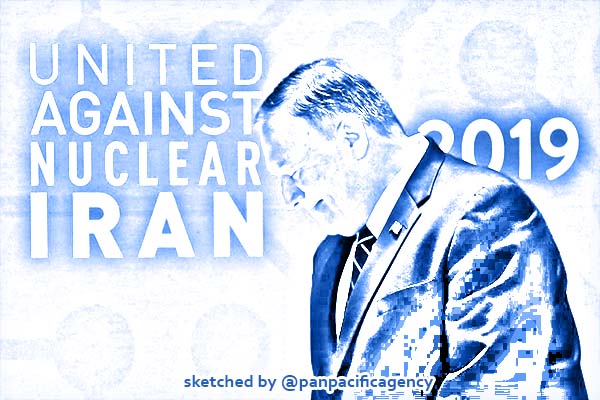US sanctions Chinese firms for allegedly shipping Iranian oil

Secretary of State Mike Pompeo announced in New York on Wednesday new sanctions intended to cut off Iran’s crude oil exports. PHOTO: JASON DECROW/AP. Sketched by the Pan Pacific Agency.
WASHINGTON D.C., Sep 26, 2019, WSJ. The Trump administration blacklisted several Chinese companies including units of a state giant for allegedly shipping Iranian oil in violation of U.S. sanctions, attempting to cut off the last vestiges of Iran’s crude exports, reported The Wall Street Journal.
The action signaled the administration’s commitment to its “maximum pressure” campaign as European allies and other nations push Washington to ease sanctions and cool rising tensions between the U.S. and Iran.
The move Wednesday hit state-owned companies that collectively represent some of the biggest movers of oil and petroleum products in the world. The action is expected to strain ties further between Washington and Beijing as the two superpowers clash over trade, security and a host of other topics, former U.S. officials warn.
“We’re telling China and all nations: Know that we will sanction every violation of sanctionable activity,” Secretary of State Mike Pompeo said in announcing the measures Wednesday on the sidelines of a United Nations summit in New York.
Iranian President Hassan Rouhani, while not addressing the specific sanctions imposed Wednesday, called the U.S. campaign “merciless economic terrorism” and said his government wouldn’t negotiate with the U.S. unless Washington lifted sanctions
The Chinese Embassy in Washington didn’t immediately respond to requests for comment. Beijing has criticized U.S. sanctions as extraterritorial.
The move sets the tone for U.S. leadership efforts this week at the U.N. General Assembly to persuade international powers including China, a Security Council member, to back its pressure campaign in the wake of attacks on Saudi Arabian energy facilities, which Washington and others blame on Tehran.
“Countries are indeed awakening to the truth that the more Iran lashes out, the greater our pressure will and should be,” Mr. Pompeo said, promising more action ahead. “As long as Iran’s menacing behavior continues, sanctions will not be lifted, they will be tightened.”
The new steps are among an escalating series of sanctions that have battered Iran’s economy but have not yet persuaded Tehran to accede to U.S. demands for a new nuclear, missile and security pact.
Iran has responded by revving up its nuclear-enrichment operations, breaching the terms of the 2015 nuclear agreement that the Trump administration pulled out of last year. At the same time, U.S. officials charge that Tehran has taken part in attacks on oil supplies critical to the global economy that flow from and through the region.
China, as the biggest remaining buyer of Iran’s crude, has so far resisted U.S. attempts to cut its consumption of the Mideast country’s supply to zero.
Mr. Pompeo, Treasury Secretary Steven Mnuchin and other top Trump administration officials have cautioned Beijing and other nations for months that the U.S. would punish those it found facilitating Iranian crude sales.
Those comments, as well as action against several smaller Chinese-run companies, were seen as a warning shot to China’s government. The administration has largely refrained from hitting any major operations in part to avoid inflaming political tensions, analysts said.
But the latest sanctions target units of the state-owned shipping giant Cosco Group—Cosco Shipping Tanker (Dalian) Co. and Cosco Shipping Tanker (Dalian) Seaman & Ship Management Co.— and affect more than four dozen vessels.
Cosco is the world’s biggest shipping operator in terms of fleet and capacity, operating more than 1,100 vessels of all types.
A technical note issued separately by the Treasury Department on Wednesday saying that the sanctions don’t apply to the parent companies may temper potential political frictions. Still, state-owned Cosco criticized the action.
“Sanctioning one of the world’s premier energy-shipping companies that abides with all international trade norms is a wrong move,” a senior Cosco executive said. “The U.S. should stop policing and punishing legitimate maritime operators.”
Further, two other sanctioned companies, Kunlun Shipping Co. and Kunlun Holding Co., are linked to state oil company China National Petroleum Corp.
In the spring, the U.S. accused CNPC of carrying Iranian crude to China on the Pacific Bravo tanker, through a subsidiary, the Bank of Kunlun. That bank was also central in sanctions evasion under the Obama administration’s Iran pressure campaign, according to the U.S. Treasury, punishing it by using one of its most potent financial weapons: cutting off access to the dollar funding that fuels most of the world’s international trade and finance.
The Kunlun companies didn’t respond to requests for comment, including calls to the agent for firms with identical names registered in New York.
U.S.-based companies and individuals are barred from conducting business with the newly blacklisted firms, and others who are found to be continuing transactions with them risk punitive action by the U.S. as well, a liability that will complicate their ability to secure financing and insurance.
That move pits Washington squarely against Beijing, representing a potential economic and political flashpoint for the two nations, said Jeffrey Schott, a former U.S. Treasury official now at the Peterson Institute for International Economics.
China still accounts for the majority of the estimated 500,000 barrels a day of oil Iran exported last month, according to Matt Smith, director of commodity research at the vessel tracker ClipperData. Beijing has also frustrated the administration’s attempts to squeeze Venezuela’s oil exports.
Iran-owned Suezmax Sonia I, for example, loaded Iranian crude around Aug. 20 and headed to China and is believed to be heading back to the Persian Gulf, according to ClipperData.
Hitting major Chinese companies, Mr. Schott said, “would escalate the U.S.-China economic conflict to another level.”
By Ian Talley in Washington and Costas Paris and Courtney McBride in New York. Michael Gordon in New York contributed to this article.